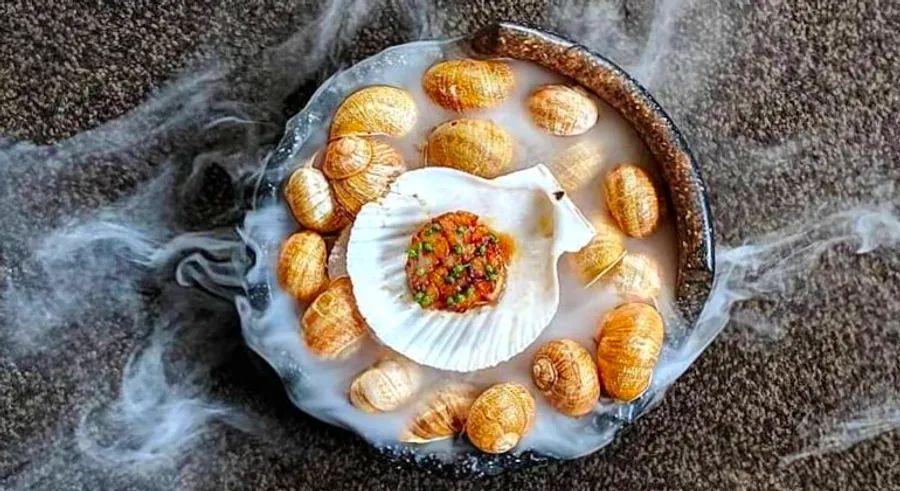Could Malaysia be the home of the world’s next culinary sensation in Indian cuisine?

When you reflect on the meaning behind the name, it becomes clear that Nadodi is a perfect fit for this Indian restaurant.
The term 'Nadodi,' meaning 'nomad' in several South Indian languages, echoes the migration of people from that region to distant lands, including Malaysia, where the restaurant now resides.
The name also carries historical weight, recalling the forced migrations of laborers under British rule, the adventurous traders seeking new horizons, and civil servants on the move in search of better opportunities.
This pattern of migration continues today, with the traditional white dhotis and bare-chested estate workers replaced by the checkered shirts and starched khakis or business suits of modern professionals who thrive abroad.
Nadodi is also a tale of how food transcends borders – how generations of migrants and explorers carry their culinary traditions to new lands, enriching the cultural tapestry of the places they call home.
It's also the story of Nadodi’s founders – South Indian wanderers who, as children, grew up far from their native roots in cities like Kolkata, Mumbai, and Delhi, before their journeys ultimately brought them to Kuala Lumpur.
Kartik Kumar, the brand director of the restaurant, remembers how he, along with chef Sricharan Venkatesh and mixologist/operations manager Akshar Chalwadi, originally considered naming the restaurant 'Cinnamon.'
“But upon arriving in Kuala Lumpur and experiencing the street food and local restaurant dishes, we noticed something striking – the names of the dishes were all too familiar, dishes we’d enjoyed in Southern India, Kerala, Tamil Nadu, and even Sri Lanka,” he shares.
“That realization made us reflect on how these flavors had made their way to KL, and how this food had traveled across time and distance,” he adds.
And so, in 2017, Nadodi was born, marking the beginning of an extraordinary culinary journey.

The Gaggan Legacy
Located in the heart of Kuala Lumpur, just beneath the iconic Petronas Twin Towers, Nadodi may be the only restaurant in the world that could rightfully be seen as the spiritual successor to Bangkok’s legendary Gaggan, which will be closing its doors next year.
Yet, the core team behind Nadodi would be the first to downplay any comparisons – even though two of the three founders once worked at Gaggan, under the mentorship of renowned chef Gaggan Anand. (Kartik served as the operations manager, while Sricharan honed his skills in Gaggan's kitchen.)
Both Kartik and Sricharan credit Chef Gaggan, whose restaurant is often ranked as the best in Asia and among the top in the world, for transforming their perspective on food.
“We hold Chef Gaggan in high regard. When I joined his restaurant, everything changed for me,” Kartik reflects, highlighting how the Bangkok-based chef’s use of fresh ingredients, experimental cooking techniques, and innovative plating shaped his own culinary development.
This influence is evident in Nadodi’s dining philosophy: the restaurant sources its tableware from a local artisan in Kuala Lumpur, and its ingredients come from carefully selected farms around the city. Their latest discovery is a farmer who raises milk-fed goats, a new addition they plan to feature in future dishes.
This unique approach has already garnered significant recognition, including the prestigious “Most Innovative Restaurant” award from Tourism Malaysia.
An unforgettable dining experience
The influence of Gaggan is most evident in the food itself. On the day of this interview, Sricharan’s menu begins with 'Red Kari,' a modern take on a traditional Sri Lankan beetroot curry, but without the curry.
Instead, the dish is a work of art – a refreshing beetroot sorbet, pickled beets, roasted peanuts, dehydrated beetroot powder, and a base of curry-flavored foam.
Next up is the Baduga Scallops. The Baduga tribe hails from the Nilgiri region in Tamil Nadu, and while they may never have encountered Hokkaido scallops, Sricharan’s genius lies in combining the Baduga spices with the sweet, tender scallops, all served on a bed of seashells and dry ice. It’s pure culinary poetry.
The rest of the meal follows suit – the Iberico lamb chops are expertly seasoned with habaneros, mint, and a touch of South Indian mango pickle for a burst of flavor.
Nadodi’s interpretation of fish head curry – a South Indian classic – is a nitrogen-aerated curry foam served atop steamed red snapper. It's more akin to chawanmushi than the typical fiery, rustic fish head curry you'd expect from South India.
Akshar’s cocktails follow a similar philosophy – while the base is gin or vodka, the flavors are rooted in South Indian cuisine, evoking the region’s soups rather than traditional cocktails. His gin cocktail features Vadouvan spices – a Puducherry spice blend popular in France – and moringa leaves, while his vodka creation, simply named Rasam, is inspired by the tangy South Indian tamarind soup.
Dining at Gaggan is like attending a rock concert – all about the chef’s dynamic personality and energy – whereas an evening at Nadodi feels more like a symphony orchestra performance: refined, elegant, and executed with flawless precision, from the stunning artwork on the walls to the impeccable service provided by the staff.
Raising the bar for South Indian cuisine
However, Kartik and Sricharan are adamant that what sets Nadodi apart from Gaggan – and any other Indian restaurant – is its commitment to redefining South Indian cuisine through modern, progressive techniques.
“Our flavors, our presentation – everything is authentically South Indian. There’s simply no comparison to Gaggan,” Kartik firmly states.
“Nadodi is a completely different concept. We focus solely on South Indian cuisine. I’m not serving chicken tikka or naan here. What you’ll get is rasam, crab curry – the true flavors of our heritage. That’s what Nadodi is all about,” he explains.
For Kartik, Sricharan, and Akshar, elevating South Indian food is a passionate mission.
“There are many Indian restaurants offering fine dining, but none are dedicated exclusively to South Indian cuisine,” Akshar observes.
“Even in India, the focus tends to be on dishes like dosa or vadai,” he adds.
Kartik believes it’s time for the perception of South Indian cuisine to shift.
“When it comes to European food, they’ve embraced it with pride. But with our cuisine, we’ve always been focused on feeding ourselves. We rarely cook for others,” he reflects.
“But consider this: fermentation – our ancestors mastered it. That’s how we got idli and dosa. What is poppadom? It’s dehydration. And our pickles? They’re preservatives,” he points out.
“We’ve been practicing preservation, fermentation, and dehydration for centuries. Now it’s time to take pride in these techniques and showcase them to the world,” he declares.
South Indian fine dining in a world of street food – is it possible?
If Nadodi’s goal is to elevate South India’s humble dishes, then surely Malaysia – a street food haven, but not yet a global fine-dining destination – may not seem like the ideal place to do so?
What steps does the country need to take to compete with regional fine-dining centers like Singapore and Bangkok?
“KL is still growing and remains a relatively small market for fine dining,” Kartik acknowledges. “Few people truly appreciate fine dining here. The support from consumers in KL needs to improve,” he adds.
“Perhaps Tourism Malaysia should take a more active role in supporting restaurants striving to position KL as a fine-dining destination. Malaysia has no shortage of food varieties, but they need to be packaged and presented in a compelling way,” he suggests.
One thing is clear – if Kuala Lumpur does eventually rise to the ranks of global fine-dining hubs, Nadodi, created by nomads, will undoubtedly stand proudly among the city’s finest restaurants.
Nadodi, located at Lot 183, Jalan Mayang, Kampung Baru, 50450 Kuala Lumpur, Malaysia. For reservations, call +60 17390 0792.

1

2

3

4

5
Evaluation :
5/5